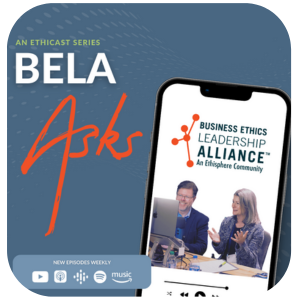[00:00:00] Speaker A: Hi everyone.
[00:00:01] Speaker B: Today we're going to talk about the risks that organizations run when they fail to take their Speak up reporting seriously. I'm your host, Bill Coffin, and this is the Ethicast.
Speaking up. To report misconduct is the lifeblood of a strong ethics and compliance program, a strong culture of integrity, and a strong enterprise, period.
But all too often we see Speak up efforts falter, whether it's because folks don't trust the system or because they fear retaliation for raising their hand over unacceptable or illegal behavior.
But sometimes, and even more troubling forces at work, organizations that either can't or won't take proper action on reports of misconduct that have been surfaced. Regardless of how this happens, when it does, it sends a signal that misbehavior is somehow beyond reproach, which can significantly injure an enterprise's sense of organizational justice.
Once that corrosive effect takes root within a culture, it can be very difficult to address it before some truly unfortunate things begin to happen.
With us today is Charles Kane. Charles is a Forensic and Integrity Services managing Director at Ernst & Young LLP based in Washington, D.C. he he is part of the Investigations and Compliance team and has deep experience with anti bribery and corruption issues. Charles has more than 25 years of experience with government investigations and previously served for over eight years as the Foreign Corrupt Practices Act Unit Chief at the sec.
While he has particular experience with FCPA matters, over the course of his career he has worked on a full range of securities enforcement matters, including complex financial fraud. Charles, welcome to the show. It's great to have you.
[00:01:50] Speaker A: Thank you, Bill. It's great to be here.
[00:01:52] Speaker B: About 85% of employees say that they would speak up against misconduct if they witnessed it, but only half actually do, mostly out of fears of retaliation and concerns that the issue won't be actioned on. From your perspective, what kind of damage are you seeing this phenomenon inflict upon businesses?
[00:02:10] Speaker A: I think it's kind of multiple levels to it. I mean, there's the immediate impact where the company loses the ability to address the particular issues as they arise.
It's also a lack of an early warning into potentially more significant issues. And it's also a loss of an important feedback mechanism on the success of your compliance program as a concept, but that at the same time, it also gives you a pretty clear indication and it's a warning sign for the program itself.
And perhaps it's reflecting some unpleasant truths about your the underlying corporate culture.
[00:02:46] Speaker B: Where do you see companies most commonly dropping the ball when it comes to receiving and investigating reports of misconduct.
[00:02:53] Speaker A: I think the biggest thing is communication, right? I think we, I think we would all recognize that there's a tension between the need for confidentiality of an investigative process, the timeline for a meaningful investigation to take place, and the reporter's desire for immediate action, immediate feedback and visible response. I was just speaking with a compliance professional yesterday about how their company is finding ways to communicate with anonymous reporters on an ongoing basis while maintaining anonymity, which I thought was really intriguing. And they're finding some initial success as that being a very positive development in their program writ large.
But I think the lack of any communication at all just leads to people assuming the worst. And so that really is the biggest problem.
[00:03:42] Speaker B: Can you talk about the impacts that you have seen when companies drop the ball on the investigations piece and how that has a follow on effect on trust in the Speak up system itself?
[00:03:52] Speaker A: And I've seen like kind of the worst of the worst over a career on the enforcement side of things.
And you know, I also had a lot of visibility into people who are ultimately government whistleblowers. And these are folks who, the vast, vast majority were people who, they wanted the right thing to be happening. They were, they were trying to get attention internally. They felt that they were rejected and weren't being taken seriously and they ultimately, you know, go to the government. I think when you have a situation where people just perceive that they're not going to be taken seriously, it's grossing to the corporate culture writ large. But it also, it may bring people raising the alarm on issues that aren't maybe as significant as they perceive them to be and doesn't give the company a chance to address them meaningfully early on and it just kind of snowballs and you wind up sometimes with kind of the worst case scenario where a small problem becomes a big problem, becomes a government facing problem.
[00:04:57] Speaker B: Now, you have extensive government experience and I know you've come across so many of these cases in the course of your career. So I guess my next question for you kind of draws upon that a little bit, given what you've already seen in the past. You know, what are your recommendations for how organizations can address a weak or malfunctioning Speak up program? And how might this approach differ when approached by proactively versus in the wake of a high impact Speak up failure or when somebody simply brings an issue to the government?
[00:05:24] Speaker A: Yeah, I think. Well, I think doing it proactively is going to be a lot easier than after there's been a kind of a major problem or event because as you say it relies on trust. By the time something large has happened, there's probably a lot of mistrust within the organization. And so rebuilding that is going to take a lot more time than taking proactive steps to make sure the appropriate levels of trust are within the organization.
I think it goes back to communication and messaging. I think companies need to demonstrate that they affirmatively want to make positive change, that they value those who speak up. I think one way is to effectively communicate really about how people bring issues to the forefront has led to positive change for the organization both culturally and oftentimes, leading to success in the marketplace. It's not everybody, not everything people speak up about are problematic from a compliance perspective. But if they are reluctant to speak up about, you know, kind of anything, you're losing the ability to make really significant improvements across your organization writ large.
[00:06:34] Speaker B: So, Charles, as a follow up question, you know, when we look at the news, there have been a lot of stories recently, and most recently in the at the Cast, we covered how the Nestle CEO was dismissed for failing to disclose an office romance. But we see with a lot of stories like that, a lot of, you know, big corporate scandals, inevitably there's a piece in there where we see that the Speak up program has really functioned as it ought to. And what we like to focus on is not the downfall of a CEO. We like to focus on how great it is to see that, you know, the Speak up program is actually behaving, it's actually working as it ought to because that kind of gets underreported. So, you know, from your particular standpoint, I'd love to get your thoughts are on when you see a story out in the news of some sort of corporate situation. But you can tell that the Speak up system did its job. What does that make you think? How does it make you feel?
[00:07:25] Speaker A: Well, I think it's great. And, and, you know, not, not great what happened, what happened. Right. But it, I think it speaks volumes that those are organizations that have, you know, truly embraced a positive corporate culture where people are willing to speak up without fear of retaliation about potential misconduct at the highest levels of the organization.
And I think that's what everyone should be striving for. Right? No one should be immune.
You want to hear about everything, whatever it may be, so that you can act appropriately, make whatever adjustments are needed.
[00:08:01] Speaker B: Well, Charles, thank you so much for joining us today to talk about the risks of not taking Speak up culture seriously. I know this is something that you are very keen on, and I hope that your Insights will help folks who are trying to get organizational buy in to strengthen their own Speak up efforts. So again, thank you so much for joining us on today's program.
[00:08:17] Speaker A: Thanks Bill. It's a real pleasure. I look forward to hearing your next epicast.
[00:08:21] Speaker B: Be sure to join us on September 24th when Charles and his colleague Gary Burke, US integrity and remediation services leader at Eye, will lead a free Ethisphere webinar, Building Trust and taking Speak up seriously. In it, Charles and Gary will explore best practices around how organizations respond to employee reports of misconduct and the risks associated with failing to act when employees speak up. To register, visit ethisphere.comwebinars to appear as a guest on this program and share an ethics and compliance best practice or success story. Drop us a
[email protected] ethecast thanks for joining us. We hope you've enjoyed the show. For new episodes each week, be sure to subscribe on YouTube, Apple Podcasts, and Spotify. And if you don't mind, please share us with a colleague on LinkedIn that really helps out too.
That's all for now, but until next time, remember, strong ethics is good business.


